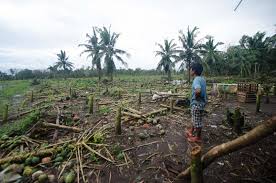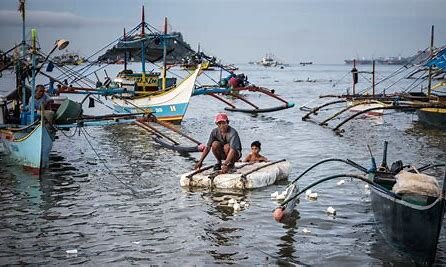Luke Allen – Military Political Analyst – Makati, Manila – lukeallenmanila@journlist.com
Typhoon Carina has left a trail of devastation across the Philippines, resulting in significant agricultural losses estimated at P203.38 million. On Thursday, the Department of Agriculture (DA) disclosed that the typhoon has severely impacted Central Luzon, MIMAROPA, Western and Eastern Visayas, the Zamboanga Peninsula, SOCCSKSARGEN, and CARAGA regions.
According to DA Bulletin #8, the natural disaster has affected 9,198 farmers and damaged 10,700 hectares of agricultural land. The bulletin further detailed that the typhoon caused a production loss of 2,575 metric tons, severely impacting the livelihoods of those dependent on agriculture in these regions.
Typhoon Carina’s impact on the agricultural sector must be considered. The affected regions are crucial for the Philippines’ food production and supply chains, and the damage has raised concerns about potential food shortages and increased prices in the coming months. Farmers in these areas have been struggling to cope with the aftermath, with many facing the daunting task of rebuilding their livelihoods from scratch.
The Department of Agriculture has swiftly mobilized resources to support the affected farmers in response to the crisis. The DA has announced the availability of survival and recovery loan funds to help farmers recover. These loans, capped at P25,000 per farmer, come with a favorable repayment period of three years, providing some much-needed financial relief to those who have lost their crops and income.
The Quick Response Fund (QRF) has also been activated to provide immediate assistance. The QRF is designed to rapidly deploy resources to mitigate the impacts of natural disasters, ensuring that affected communities receive timely support. The availability of these funds underscores the government’s commitment to addressing farmers’ needs and stabilizing the agricultural sector.
Agriculture Secretary William Dar emphasized the importance of these measures in a press conference. “We are committed to supporting our farmers during these challenging times. The survival and recovery loan funds and the Quick Response Fund are crucial components of our strategy to help our agricultural sector recover swiftly from the devastation caused by Typhoon Carina,” Dar stated.
Local government units (LGUs) in the affected regions have also been working closely with the DA to assess the full extent of the damage and coordinate relief efforts. Emergency response teams have distributed food packs, seeds, and other essential supplies to the hardest-hit areas. These collaborative efforts ensure that aid reaches those who need it most and that the recovery process begins without delay.
Farmers’ groups and agricultural associations have expressed gratitude for the government’s swift response but have also called for additional long-term support measures. They are advocating for enhanced disaster preparedness programs, better infrastructure to withstand future typhoons, and more robust insurance schemes to protect farmers from the financial fallout of such natural disasters.
The economic impact of Typhoon Carina extends beyond agriculture. Infrastructure damage, including roads and bridges, has hampered the transportation of goods and services, further complicating the recovery process. The National Disaster Risk Reduction and Management Council (NDRRMC) is conducting a comprehensive assessment of the overall damage to infrastructure and estimating the funds required for rehabilitation.
As the nation grapples with the aftermath of Typhoon Carina, the resilience and solidarity of the Filipino people are once again being tested. The government’s immediate response and activation of financial aid programs are steps in the right direction. Still, the road to recovery will require sustained efforts and cooperation from all sectors of society. The focus now is on rebuilding more robust and more resilient communities that can withstand the challenges posed by future natural disasters.
The recovery journey is just beginning for the affected farmers and their families. With the support of the government and the community, they hope to overcome this adversity and rebuild their lives.
**For further information, please contact:**
Department of Agriculture Public Affairs Office
Phone: (02) 8928-8741
Email: da_pao@da.gov.ph














